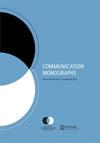文化差异作为制度互动中争论的资源
IF 1.5
2区 文学
Q1 COMMUNICATION
引用次数: 7
摘要
摘要本文分析了机构成员在会议互动辩论中如何适应文化差异。会员分类分析(MCA)对亚裔美国商会(Asian American Chamber of Commerce)为期8个月的实地考察中21小时的录音对话进行了分析,结果表明,参与者在构建、支持或反对与制度相关的活动的论点时,倾向于将文化差异作为一种资源。参与者将文化类别之间的文化差异或将文化差异导向的参与者视为理所当然的事实,并利用这一事实来支持他们的论点。总体而言,本研究通过阐释文化差异是一种话语现象,有助于将跨文化交际理论化。参与者互动的MCA揭示了文化差异通常构成制度生活的微妙而复杂的方式。本文章由计算机程序翻译,如有差异,请以英文原文为准。
Cultural difference as a resource for arguments in institutional interactions
ABSTRACT This article analyzes how institutional members orient to cultural difference during arguments in meeting interactions. Membership categorization analysis (MCA) of 21 h of audio-recorded conversations from eight months of fieldwork with an Asian American Chamber of Commerce illustrates that participants oriented to cultural difference as a resource when building, supporting, or opposing arguments about institutionally related activities. Participants constructed cultural differences between cultural categories or participants oriented to cultural difference as a taken-for-granted fact and used this fact to support their arguments. Overall, this study contributes to theorizing intercultural communication through illustrating how cultural difference is a discursive phenomenon. MCA of participants’ interactions reveals nuanced, complex ways that cultural difference routinely constitutes institutional life.
求助全文
通过发布文献求助,成功后即可免费获取论文全文。
去求助
来源期刊

Communication Monographs
COMMUNICATION-
CiteScore
5.40
自引率
0.00%
发文量
12
期刊介绍:
Communication Monographs, published in March, June, September & December, reports original, theoretically grounded research dealing with human symbolic exchange across the broad spectrum of interpersonal, group, organizational, cultural and mediated contexts in which such activities occur. The scholarship reflects diverse modes of inquiry and methodologies that bear on the ways in which communication is shaped and functions in human interaction. The journal endeavours to publish the highest quality communication social science manuscripts that are grounded theoretically. The manuscripts aim to expand, qualify or integrate existing theory or additionally advance new theory. The journal is not restricted to particular theoretical or methodological perspectives.
 求助内容:
求助内容: 应助结果提醒方式:
应助结果提醒方式:


